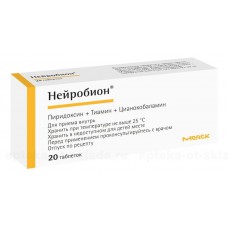Expiratiob date: 01/2022
The composition and form of issue:
Tablets, film-coated. 1 tablet contains active substances:
pyridoxine hydrochloride (vitamin B6) 200 mg
thiamine disulphide (vitamin B1) 100 mg
cyanocobalamin (vitamin B12) 240 mcg
excipients: magnesium stearate cellulose corn starch gelatin lactose monohydrate talc wax acacia glycerol 85% povidone 25 calcium carbonate silicon dioxide colloidal kaolin titanium dioxide sucrose
in a blister of aluminum foil and PVC 10 PCs. in a pack of cardboard 2 blisters.
Description of the dosage form:
Biconvex round tablets, coated, shiny, almost white in color.
Pharmacokinetics: Thiamine
After ingestion, it undergoes dose-dependent transport, the mechanism of which is dual in nature: active absorption up to a concentration of 2 mmol and passive diffusion at concentrations >, 2 mmol. T1/2 — about 4 hours Rapidly metabolized, it is excreted in 4-10 days.
Pyridoxine. Pyridoxine is absorbed very quickly, mainly in the upper gastrointestinal tract, and is excreted in a maximum of 2-5 hours. The human body contains about 40-150 mg. Per day, 1, 7-3, 6 mg is excreted in the urine.
Cyanocobalamin. Cyanocobalamin is absorbed from the gastrointestinal tract through 2 mechanisms:
- - release under the action of gastric juice and rapid binding to the internal factor
- - regardless of the internal factor due to passive diffusion into the blood.
At doses >, 1, 5 mcg, the latter mechanism plays a significant role. Excess vitamin B12 accumulates in the liver.
From the liver, it is excreted with bile into the intestines and is largely reabsorbed during the intestinal-hepatic circulation. The metabolic rate of vitamin B12 is 2, 5 mcg/day.
Description of pharmacological action:
The drug contains a combination of neurotropic active substances of the vitamin B complex. the vitamins contained in the drug — thiamine (B1), pyridoxine (B6) and cyanocobalamin (B12) — play a special role as coenzymes in the intermediate metabolism occurring in the Central nervous system and peripheral nervous system.
Therapeutic use of these vitamins in various diseases of the nervous system is aimed at, on the one hand, to compensate for the existing deficit (possibly due to the increased need of the body due to the existing disease) and, on the other hand, to stimulate natural recovery mechanisms. The analgesic effect of the vitamin b complex has a beneficial effect on the therapeutic result.
Indications:
- in the complex therapy of the following neurological diseases: trigeminal
- neuralgia
- facial
- neuritis
- pain syndrome caused by diseases of the spine (intercostal neuralgia, lumboishialgia, lumbar syndrome, cervical syndrome, cervical-brachial syndrome, radicular syndrome caused by degenerative changes in the spine).
Contraindications:
Hypersensitivity to any component of the drug.
Use during pregnancy and lactation:
to date, there are no data on undesirable effects during pregnancy after administration of vitamins B1, B6 and B12 in the recommended doses.
Side effect:
Allergic reactions are possible, which mainly occur in the form of skin manifestations.
Drug interaction: Pyridoxine
When used simultaneously with levodopa, pyridoxine may reduce the antiparkinsonian effect of levodopa. Increases the effect of diuretics.
Isonicotine hydrazide, penicillamine, cycloserine, and estrogen-containing oral contraceptives weaken the effect of pyridoxine.
It is well combined with cardiac glycosides (pyridoxine increases the synthesis of contractile proteins in the myocardium), with glutamic acid and asparkam (increases resistance to hypoxia).
Cyanocobalamin. Aminoglycosides, salicylates, antiepileptic drugs, colchicine, potassium preparations-reduce absorption. It can not be combined with drugs that increase blood clotting. Taking B12 may mask a lack of folic acid.
Dosage and administration:
Inside, without chewing, with a small amount of water, it is better during meals. Adults and adolescents over 15 years of age — 1 table 3 times a day or as prescribed by a doctor. Children under 15 years of age-as prescribed by a doctor.
The duration of treatment is determined by the doctor.
Overdose:
Vitamins B1, B6 and B12 have a wide therapeutic range.
Vitamin B1: no symptoms of overdose after ingestion have been reported.
Vitamin B6. Overdose: neuropathies with ataxia, sensitivity disorders, cerebral convulsions with changes in the EEG, in some cases — hypochromic anemia and seborrheic dermatitis (were described after ingestion of more than 2 g/day).
Vitamin B12: after high-dose parenteral administration (as well as in rare cases after oral administration), allergic reactions, eczema skin disorders and a benign form of acne were observed.
Special instruction:
When vitamin B12 is administered, the clinical picture and laboratory parameters for funicular myelosis or pernicious anemia may lose their specificity.


